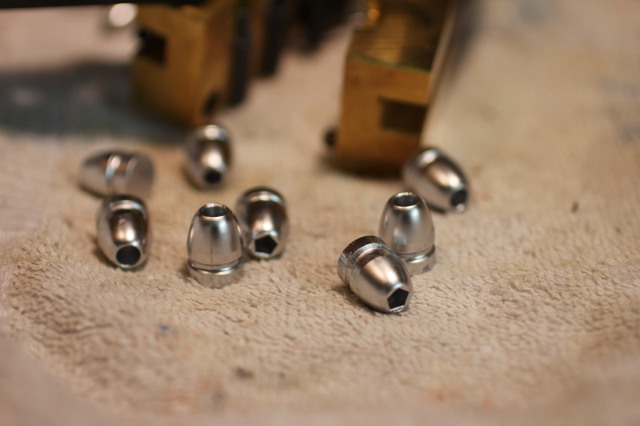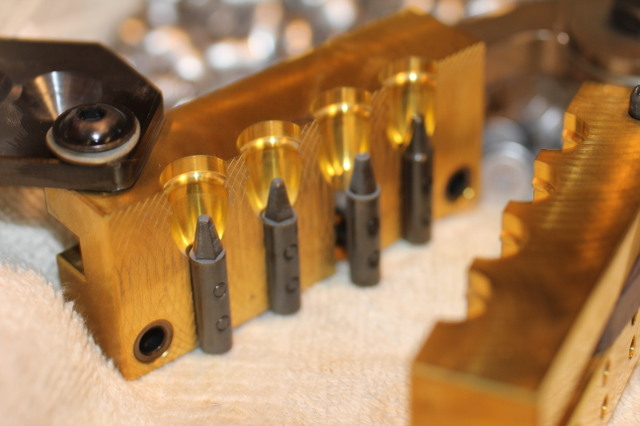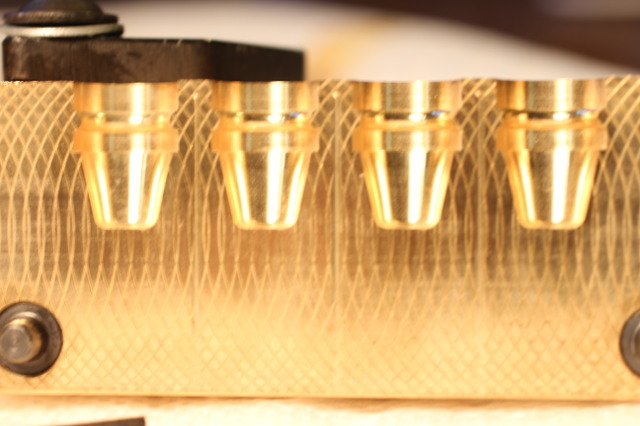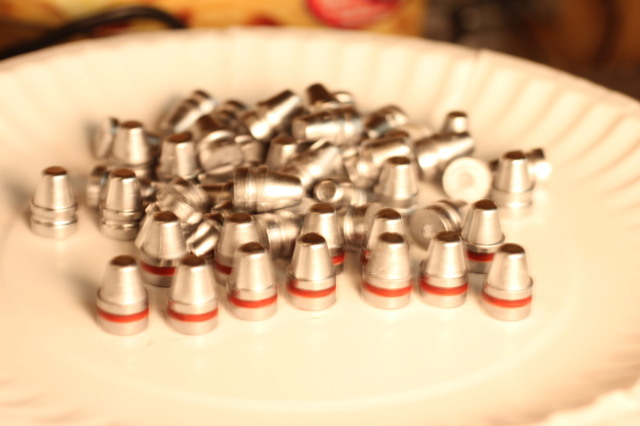

 The Accurate Reloading Forums
The Accurate Reloading Forums  THE ACCURATE RELOADING.COM FORUMS
THE ACCURATE RELOADING.COM FORUMS  Guns, Politics, Gunsmithing & Reloading
Guns, Politics, Gunsmithing & Reloading  Reloading
Reloading  Hard cast lead bullets?
Hard cast lead bullets?Go  | New  | Find  | Notify  | Tools  | Reply  |  |
| new member |
Hi all, I'm trying to find bullets just like everyone else and it's damn near impossible. I was thinking that I wanted to stay with jacketed bullets but with how hard it is to find them, I need to think about cast bullets. I came across a guy that makes hard cast lead bullets and wanted to know if anyone on here has any experience and input? I don't want a piece of crap bullet that has no accuracy or dirties my barrel up more than necessary. Thanks. | ||
|
| one of us |
What are you loading for? Pistol, rifle cannon? I strongly dislike the term "hard cast". It means nothing other than he's not using pure lead. Buying cast lead boolits for anything is a crap shoot. If you're extremely lucky, you will get something that shoots good and does not lead your bore. If you're NOT lucky you will have lousy accuracy, and a leaded bore. Shooting cast boolits will ALWAYS make your firearm dirtier that jacketed or plated. if you run, you just die tired It's not that life is so short, it's that death is sooo long! Speak kindly to me, beloved master. Revel in my unconditional love, and give me every minute that you can spare, for my time with you is short. Your faithful dog | |||
|
| new member |
Oh, sorry. Shooting .45 acp. I have a Springfield XDm. Here's a link to what I'm talking about. http://www.armslist.com/posts/...lets-9mm-and--45-acp I am completely new to reloading so I'm just trying to figure everything out. | |||
|
| One of Us |
You need to slug your pistol to find out what size you need. Most are .452 sized and lubed. I make up my own alloy from range scrape,wheel weights,pure lead and lino. Just remember fit is king. | |||
|
| new member |
I got a reply from the guy who makes the bullets and he said that he mixes lead, tin, antimony alloy. The BHN hardness ranges from 18-22. Hope this helps with someone's opinion/suggestion. | |||
|
| new member |
Plainsman456 - how do I slug my pistol? Can I bring it to my indoor pistol range and have them do it? I guess I just don't know what you're saying I need to do. | |||
|
| One of Us |
Monsterman--Alloies cannot be tempered. The hardness is a very much unknown. Not known as to how deep it goes, how long it takes , how long it lasts. If you are going to shoot much, cast your own. It's not rocket science. You can read all kinds of exacting formulas, but plain old wheelweights are about as good as it gets. | |||
|
| One of Us |
| |||
|
| one of us |
18-22 is WAY TOO HARD for 45 acp. 10-12 is just about right. Other pistol shells like 38 special are well served with 12-14 BHN. You only really need 18 BHN for the hottest 44 mag, or other magnum cartridges. Rifles also do well in the 18-22 range of BHN. Fit is king! That's why slugging is important. MM, to slug your 45, you need a soft slug to drive down the length of your barrel. Best bet is to take it out of the pistol, then use a brass rod to drive the slug full length of the barrel. Then, use a micrometer to measure the diameter of the resulting slug. That will give you what you need to order for you boolit size. Always get lead boolits .001 BIGGER than your slug size. This is to prevent blow by of the hot gases, the main reason why leading occurs in a barrel. If you're lucky, your supplier can/will size to your specifications. if you run, you just die tired It's not that life is so short, it's that death is sooo long! Speak kindly to me, beloved master. Revel in my unconditional love, and give me every minute that you can spare, for my time with you is short. Your faithful dog | |||
|
| One of Us |
Don't worry about lead alloy bullets being too hard for a .45; that is impossible. No lead alloy can be as hard as copper. Get .452s and shoot thrm. Or 451s will work too; don't over think it. At least not for a .45. | |||
|
| one of us |
That whole post is wrong. alloies? Lead alloys can most certainly be heat treated. The simplest way is to drop the just solidified boolit in cold water, called water dropping. Oven heat treating is heating the formed boolit to just below where it begins to melt, then dropping in very cold water. As far as unknown hardness, hardness testers are common. Formulas for lead alloys are also wide spread. While wheel weights are a pretty consistent alloy, they're very hard to find, and some states banned them to be made from lead. Now, they're made of zinc, steel, and iron. The zinc ones, if allowed to melt with the lead, will contaminate the lead. Making it useless to make boolits. Here's 2 of the 5 molds I have for 45's;  A 200 RNFPHP cramer type HP mold from MP custom molds.  A H&G 200 SWC copy from MP molds in Slovenia.   if you run, you just die tired It's not that life is so short, it's that death is sooo long! Speak kindly to me, beloved master. Revel in my unconditional love, and give me every minute that you can spare, for my time with you is short. Your faithful dog | |||
|
| One of Us |
Shoot thousands of cast bullets through my Caspian 1911's yearly. One gun's barrel leads a bit no worries Just clean it. I buy cast bullets locally at about $40 per 1000 my total cost about .08 cents a round | |||
|
| One of Us |
Grizz, Wow on those bullet molds. That is something special! "The liberty enjoyed by the people of these states of worshiping Almighty God agreeably to their conscience, is not only among the choicest of their blessings, but also of their rights." ~George Washington - 1789 | |||
|
| One of Us |
http://www.bootheelbullets.com/ ________________________________________________ Maker of The Frankenstud Sling Keeper Proudly made in the USA Acepting all forms of payment | |||
|
| One of Us |
http://www.berrysmfg.com/products-c2-Bullets.aspx ________________________________________________ Maker of The Frankenstud Sling Keeper Proudly made in the USA Acepting all forms of payment | |||
|
| One of Us |
Some really good information here. This is what I have learned after casting for over 30 years. Size them right and you will have no trouble, regardless of alloy, assuming you load for the velocity the bullet will tolerate. Harder equals faster... There are 45 ACP shooters out there that cast with pure linotype and run them without issue, and I have shot 45 ACP "squib loads" with bullets so soft you could whittle them to nothing. As a matter of fact, one of Hensley and Gibbs' most popular 45 ACP moulds was originally designed to be used with pure linotype. Most commercial projectiles are cast harder than the hinges of hell so they don't dent in transit, and to add to that, wax based lubes are used so the bullets arrive all pretty and clean. This is not the best practice, but is tolerable so long as the projectiles are sized correctly and run rather "hot" (at the top of the load chart, not above it). Size to .452" or buy bullets sized to .452" and let the good times roll. You may get a bit of leading, because the fact is all cast bullets lead to some degree. Cleaning a handgun, including the barrel, is part of the responsibility that comes with owning them. Soap box properly re-stowed... | |||
|
| One of Us |
When I get a bit of lead in the barrel, I fire some jacketed bullets through it and that cleans it out. I DO NOT mean for you to do that if your barrel is filled with lead; this is just for light lead smears. | |||
|
| One of Us |
I did not say alloys cannot be heat treated. I said they can't be tempered. Heat treating is very unexacting. How deep does it go, how long does it take, what will the hardness be in one day, two days ------ -----. Yes hardness testers are common---hardness can be measured--on the surface. How deep does it go? Yes alloys can be blended and effect the hardness---that is not tempering. Smokin Joe read your link--it says "transformations that are induced in steel by heat treatment do not occur in lead alloys." If alloys could be tempered, you'd have a hardness that would remain constant---that doesn't happen. Grizz--thanks for the spelling correction--I swear I've seen it spelled that way someplace?? Boolits? | |||
|
| One of Us |
Verb Improve the hardness and elasticity of (steel or other metal) by reheating and then cooling it. Improve the consistency or resiliency of (a substance) by heating it or adding particular substances to it. That's tempering. hardening present participle of hard·en (Verb) Verb Make or become hard or harder That's hardening. heat treat·ment The use of heat to modify the properties of a material, esp. in metallurgy. Again I believe you are incorrect. Those things can be done to lead alloys. It is pretty predictable. Many of us all along have been saying that if your water quench or oven heat treat (hey look at that heat treatment!) that you should let your bullets age for a certain period of time before shooting them. The recommended minimum time is two weeks. This is because the molecules are still aligning (or moving) themselves and after they do so for a certain amount of time the bullet will reach a specific hardness. Now as to the matter of how deep is this hardness is subject to many varied opinions. I think that would apply to other metals as well. The most important thing is that the surface is hard as it's doing the most work in the bore. I believe bullets oven heated and quench harden more uniformly and possibly all the way through. It's hard to test the center of a bullet because when you cut it open to do the test it changes the hardness reading through working of the metal. So it's hard to say. None of this is important to the op. Just my two cents. | |||
|
| One of Us |
There are a couple of alternatives that op can look at. One is the factory swaged lead bullets and the other is copper plated bullets. Both are cheaper then jacketed. The 45acp is a low velocity low pressure round and either the two aforementioned bullets should work fine. Hornady and Speer are just two companies that sell swaged lead bullets. You can do a Google search for both swaged and copper plated bullets. Midwayusa would be source along with other vendors. | |||
|
| One of Us |
Tempering---A heat treatment applied to FERROUS metals. Ferrous basically means containing iron. I agree with you that this is not important to the original post. I do think it's a case of trying to create rocket science----when it aint. Lyman gives EXACTING amounts of alloys to add to 95% wheelweights (unknown) to come up with an exact???? How could that be? Sure, their formula works for them--they state they buy foundry pure stuff. Again more effort to make rocket science--go get some wheelweights--make some bullets and shoot them--who cares what BHN they are? | |||
|
| One of Us |
Boy, ain't that the truth!! Especially when dealing with wheelweights as a base. In MANY locales tire shops don't normally give away wheelweights because they turn the used ones they take off of wheels back over to the folks they buy their own supplies of "new" wheelweights from. Those folks melt them down along with those from many other sources, and recast the metal with new "clips" to make the "new" wheelweights. Through oxidation, mixing with metals from all kinds of sources, and so on, the wheelweights are almost never exactly the same mixture they were the time before. That in turn makes hardening them through quench, age, or whatever other process pretty much a guessing game for the home caster because neither they nor their tire shop knows exactly what the alloy is. Even shops which don't "trade-in" their old wheelweights don't know exactly the alloy of their new ones, let alone their used ones. My country gal's just a moonshiner's daughter, but I love her still. | |||
|
| One of Us |
Alberta Canuck---Even if you were disagreeing with me I'd say the same thing. It is great to see your posts and I hope the health issues are behind you. A class guy for sure. | |||
|
| Powered by Social Strata |
| Please Wait. Your request is being processed... |
|

Visit our on-line store for AR Memorabilia

